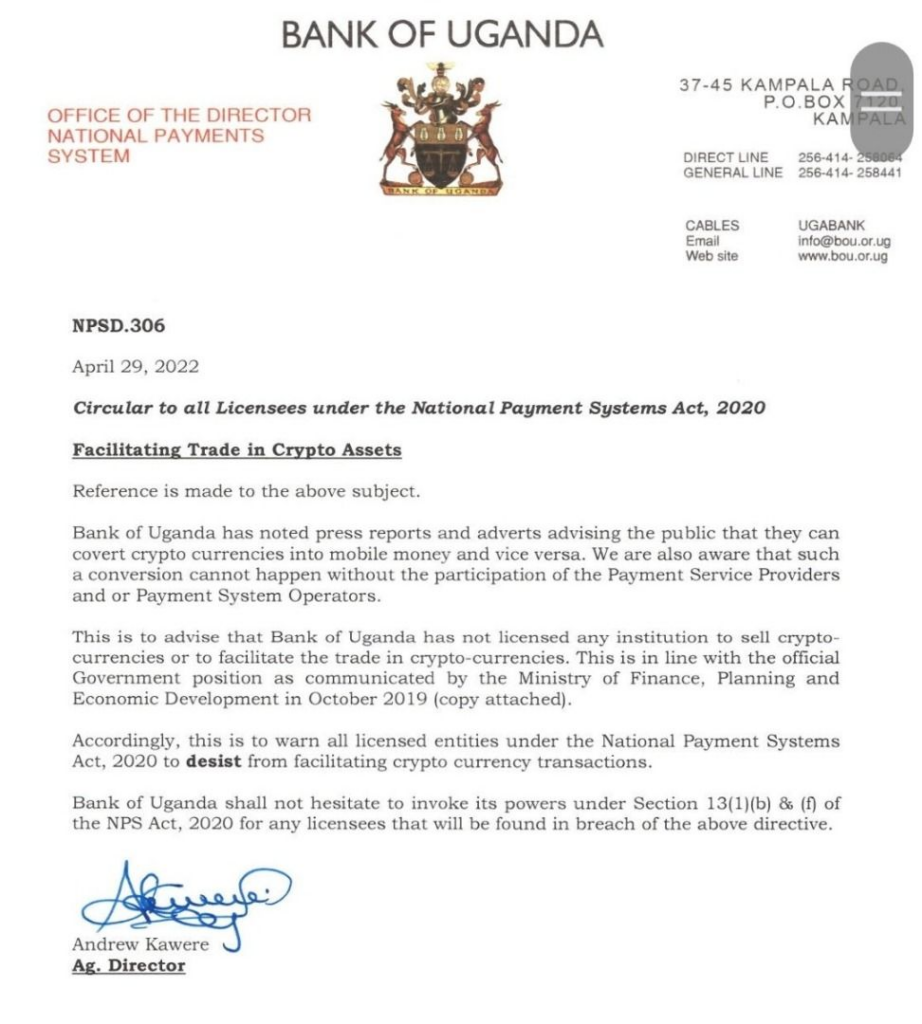For BD Insider #113, we’d be examining news from East Africa and Nigeria. We discuss the following:
- The Bank of Uganda’s crypto stance
- How the deal between Kenya and Netflix will impact Kenyan film-makers
- Nigerian airline operators’ suspension of planned operations shutdown
The Bank of Uganda has a conflating stance on Crypto
Familiar tunes from another African Central Bank, where they want to “regulate crypto” with a long spoon, but still be seen as forward-looking.
In a circular dated April 29, 2022, the Ag. Director of the National Payment Systems (NPS), Bank of Uganda, Andrew Kawere warned, in unmistakable terms, “all licensed entities under the National Payment Systems Act, 2020 to desist from facilitating crypto currency transactions.”

The circular goes further to threaten erring licensees with revocation or suspension of licence, as contained in its Payment Act 2020. “Bank of Uganda shall not hesitate to invoke its powers under Section 13(l) (b) & (f) of the NPS Act, 2020 for any licensees that will be found in breach of the above directive”.
The NPS, BoU circular constitutes a clear “cease and desist” instruction to the 14 newly-approved licensees in Uganda. And its wording is similar to the Central Bank of Nigeria’s latest directive (February 2021) to banks and other regulated entities on facilitating crypto. Only that, the circular from the CBN goes further to ask regulated entities to track down and close any accounts found to be dealing in crypto.
Yet, in an interview on May 6, 2022, Mr. Kawere implied that “the central bank has [only] cautioned licensed payments service providers to go slow on them” (emphasis mine), according to Reuters. He told Reuters that the “Bank of Uganda hasn’t banned cryptocurrency, we have simply applied some speed brakes”.
Bank of Uganda hasn’t banned cryptocurrency, we have simply applied some speed brakes — Andrew Kawere, Ag. Dir. NPS, Bank of Uganda
By slowing down on crypto, do you mean these licensed payment systems should only process ten on/off-ramp crypto transactions per day (as opposed to 1,000)? Or they should NOT process any transaction, at all? Where then does “slow” come in?
This kind of vagueness in the regulatory stance on crypto is unfavorable to investors and fintech looking to fund and operate crypto-related businesses in Uganda.
In parallel, the Bank of Uganda is trying to decide whether or not to issue a Digital Currency. Issuing a digital currency does little to answer the question on the mind of current and prospective crypto players. This is because Nigeria, the first to roll out a Central Bank Digital Currency (CBDC), eNaira is also one of the more crypto hostile nations on the continent.
And the question is: Is Uganda open to crypto or not? Can I start, fund, or operate a crypto business there or will I be witch-hunted?
Partner section
How the deal between Kenya and Netflix will impact Kenyan film-makers
Kenya’s Ministry of ICT, Innovation, and Youth Affairs has disclosed that they have signed a two-year Memorandum of Understanding (MoU) with Netflix. This MoU is an effort to strengthen the Kenyan creative industry and support a new generation of storytellers.
Why it matters: The two-year memorandum will see Netflix fund training opportunities for young filmmakers, acquire content from Kenyan producers, and support marketing and consumer protection for producers and users of digital content.
Ms. Shola Sanni, Director of Public Policy for Sub-Saharan Africa, Netflix said “this MoU will play a major role in harnessing these positive externalities driving impact beyond direct investment in local content only, to measurable inputs in other crucial aspects of the screen production value chain – such as human and institutional capacity development.”
How it will work: As part of this MOU, Netflix has invested in 3 Kenyan co-productions–which are currently in various stages of production while a number of licensed local titles are being reviewed by Netflix.
The selected Kenyan titles will be revealed at a later date closer to their premier dates on Netflix where 222 Million members in over 190 countries will have an opportunity to enjoy Kenyan storytelling and experience Kenyan culture.
Netflix will commit to supporting human capital development and institutional capacity building to enhance the digital content ecosystem in Kenya. This commitment includes the Netflix Creative Equity Scholarship Fund for Africa which is being administered through HEVA Fund for the East Africa region.
“ICT Infrastructure in the country has improved thus presenting a good business environment for OTT platforms such as Netflix. This MoU will not only facilitate job creation in the country but also unlock training opportunities for screen sector development,” says Joe Mucheru, Kenya’s ICT ministry secretary.
Additional context: Last September, Netflix Inc announced a free mobile plan with about one-quarter of its TV shows and movies in Kenya, a strategy aimed at sparking growth in a key African market, Reuters reported.
Even though the Kenyan government plans to double the digital service tax (DST) to 3% from this July, as part of its plans to tap the growing online economy to increase its domestic revenues and narrow the fiscal deficit, several big tech companies like Google, Microsoft, Amazon have established their presence in the country.
African Deals of the Week (May 2 – May 8, 2022)

Nigerian Airline operators suspend planned operations shutdown
The Airline Operators in Nigeria (AON) have backed down on their threat to suspend local flights over an increase in the price of aviation fuel. Last Friday, AON advised passengers to “reconsider their travel itinerary and make alternative arrangements” until further notice.
However, AON announced on Sunday that it will have suspended its plan. “…in the interest of national economy and security considerations, AON hereby wishes to notify the general public that the earlier announced shutdown of operations on May 9, 2022, is hereby suspended in good fate pending the outcome of hopefully fruitful engagement with government,” AON stated.
The body clarified that their decision followed intervention by the government with promises to dialogue with operators in seeking lasting solutions to the astronomic rise in the price of aviation fuel.
This is coming after Nigeria’s ministry of aviation appealed to the airline operators to reconsider their decision to shut down operations, stating that the operators should “consider the multiplier effect of the [shutdown] on Nigerians and global travellers.”
Since January, this is the second time within three months that AON will halt its plans to stop operations. In March, the Operators collectively agreed to suspend their planned shutdown in order to avert further disruption in economic activities, considering the key role air transportation plays in the logistic mix. AON further noted that local carriers will not increase their airfares.
According to the Nigerian Civil Aviation Authority, “Civil aviation is a critical element in Nigeria’s transportation system and indeed its economy. Nigeria has twenty (20) airports and many regulated airstrips and heliports; 23 active domestic airlines.”
Interesting?
Here are some of the interesting stories that we’ve come across in the past week:
- What’s Y Combinator’s impact in Africa? Find out!
- Ethiopia is preparing for M-pesa’s launch. How?
- How power dam is delaying Tanzania electric train launch.
- The curious intersection between art and NFTs. What is it?
- The reality of press freedom in Nigeria.
Job Opportunities
We’ve highlighted three job categories in today’s newsletter. The categories are product & design, engineering, admin & growth,
Product & Design:
- Mono – Technical Product Manager
- Seamfix – Product Designer
- M-Kopa – Senior Product Manager
Engineering:
- Kwik – Senior DevOps Engineer (Lagos)
- Moove Africa – Senior Backend Engineer
- uLesson – DevOps Engineer
Admin & Growth:
- Binance – Director (Nigeria)
- Nestcoin – Community Growth Marketer
- Brass – Head of Marketing
Other opportunities:
- Scholarships for African tech talents.
Have a great week!
Get passive updates on African tech & startups
View and choose the stories to interact with on our WhatsApp Channel
Explore




